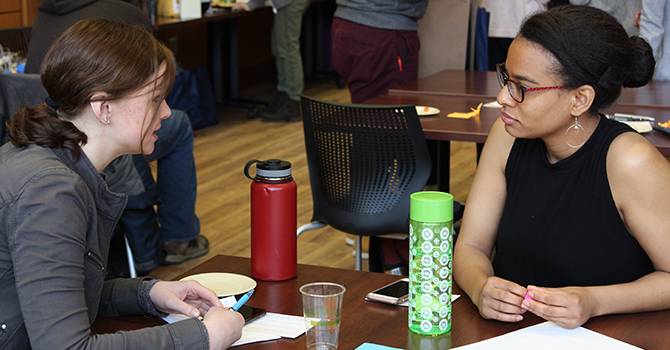Let's Continue the Conversation about Mental Health and Suicide

Traci Carson
PhD Candidate, Epidemiology; MPH, ‘17, HBHE
For many of us, death by suicide is difficult to comprehend and talk about, but the recent deaths of Kate Spade and Anthony Bourdain have sparked significant media and public conversation. I can't help but notice that these deaths have impacted my peers and community in a really powerful way.
The rate of suicide in the United States has increased dramatically over the past two decades, accounting for nearly 45,000 deaths in 2016 alone (CDC, 2018). There are known differences in suicide rate by gender, with males experiencing a higher rate than females (WHO, Global Health Observatory (GHO) data); however, suicide occurs across the spectrum of age, race/ethnicity and gender (CDC, 2018).
This topic is not easy to talk about, but that's exactly why we have to. Research has shown that acknowledging and talking about suicide may reduce suicidal ideation, and lead to improvements in mental health among adolescents and adults in treatment-seeking populations (Dazzi et al., 2014).
In a society with very little education on mental illness, combined with continued stigma around topics like suicide, many of us don't know what to say, think or feel when a death by suicide occurs.
Because these topics are uncomfortable, and may evoke personal pain and heartache, the coverage of mental health and suicide has ranged from deeply heartfelt to, in some cases, potentially harmful. Regardless, the conversation is happening, and we have to keep it going.
Let's not forget the names of those who have passed, and let's remember how hard they fought their illness to stay with us for as long as they did. At the same time, let's work together towards building and improving support and resources for those who are currently in the fight.
The newscycle is quick to move on to the next topic. Let's not let this happen, instead let's keep this conversation going until we, as a society, can talk about mental illness like we would any other physical illness or injury, like the flu or a broken bone. In the meantime, let's get comfortable with being uncomfortable. Let's extend the conversation, so that those in need of support understand that they're not alone, that their pain deserves treatment the same way a broken arm deserves a cast.
Because this societal shift won't happen overnight, we must take action to support those in need right now. Support hotlines, such as the National Suicide Prevention Lifeline (1-800-273-8255) and the CrisisTextLine (text the word NAMI to 741-741) offer resources and support for those at risk of death by suicide as well as resources for family and friends concerned about a loved one who may be at risk. These hotlines may not be the key to prevention, but they operate as one avenue for building awareness and disseminating information about mental illness and suicide.
If these recent suicides have reminded us of anything, it's that no amount of externally perceived success, happiness, or purpose can predict a death by suicide. It's vital to check in with your friends, family, and peers about their emotional and mental wellbeing. Check in on your successful friend, your strong brother, and your happy classmate.
According to the CDC, the twelve suicide warning signs include:
- Feeling like a burden
- Being isolated
- Increased anxiety
- Feeling trapped or in unbearable pain
- Increased substance use
- Looking for a way to access lethal means
- Increased anger or rage
- Extreme mood swings
- Expressing hopelessness
- Sleeping too little or too much
- Talking or posting about wanting to die
- Making plans for suicide
Additionally, the CDC suggests these five steps to help someone at risk:
- Ask.
- Keep them safe.
- Be there.
- Help them connect.
- Follow up.
Find out how these steps can help save a life.
If you are feeling impacted by these recent deaths or if you or a loved one is at risk, please reach out and talk to someone you trust. For students on the University of Michigan campus, Counseling and Psychological Services (CAPS) is available at 734-764-8312 Monday through Friday from 8 am to 5 pm and offers CAPS After Hours services as well as Urgent Walk-In Services during CAPS business hours.
Keep this conversation around mental illness going. Ask questions, ask for help, investigate online resources like the National Alliance on Mental Illness (NAMI), check in with friends, family, and peers.
Let's continue to talk about the lives lost to death by suicide. May we honor the legacy of Kate Spade, Anthony Bourdain, and the countless other lives gone too soon. Let's applaud their fight against mental illness, and may we do this by fervently supporting and encouraging treatment for mental illness, just as we would for a broken arm.
If you or someone you know is considering suicide, please contact the National Suicide Prevention Lifeline at 1-800-273-TALK (8255), text "help" to the Crisis Text Line at 741-741 or go to suicidepreventionlifeline.org. University of Michigan community members can find additional resources 24/7 at https://caps.umich.edu/resources.
References
Greenfieldboyce, Nell. CDC: U.S. Suicide Rates Have Climbed Dramatically. NPR. Retrieved from https://www.npr.org/sections/health-shots/2018/06/07/617897261/cdc-u-s-suicide-rates-have-climbed-dramatically
World Health Organization. Global Health Observatory Data Repository. Retrieved from http://apps.who.int/gho/data/view.main.MHSUICIDEREGv?lang=en
Stone DM, Simon TR, Fowler KA, et al. Vital Signs: Trends in State Suicide Rates — United States, 1999–2016 and Circumstances Contributing to Suicide — 27 States, 2015. MMWR Morb Mortal Wkly Rep 2018;67:617–624. DOI: http://dx.doi.org/10.15585/mmwr.mm6722a1.
About the Author
 Traci Carson is a PhD Candidate in Epidemiology at the School of Public Health at the University of Michigan.
Her research focuses on physiological adaptations to low energy availability and chronic
stress in female athletes and subsequent outcomes of amenorrhea and loss of bone mineral
density. She is particularly interested in eating disorders as a risk factor for low
energy availability, and is an active advocate for mental health help-seeking in collegiate
athletics. Traci graduated from Michigan Public Health with an MPH in Health Behavior and Health Education in 2017, and from the University of Michigan
School of Kinesiology with a B.A. in 2015.
Traci Carson is a PhD Candidate in Epidemiology at the School of Public Health at the University of Michigan.
Her research focuses on physiological adaptations to low energy availability and chronic
stress in female athletes and subsequent outcomes of amenorrhea and loss of bone mineral
density. She is particularly interested in eating disorders as a risk factor for low
energy availability, and is an active advocate for mental health help-seeking in collegiate
athletics. Traci graduated from Michigan Public Health with an MPH in Health Behavior and Health Education in 2017, and from the University of Michigan
School of Kinesiology with a B.A. in 2015.
